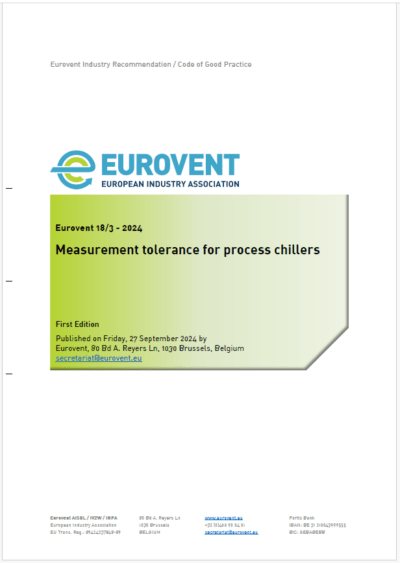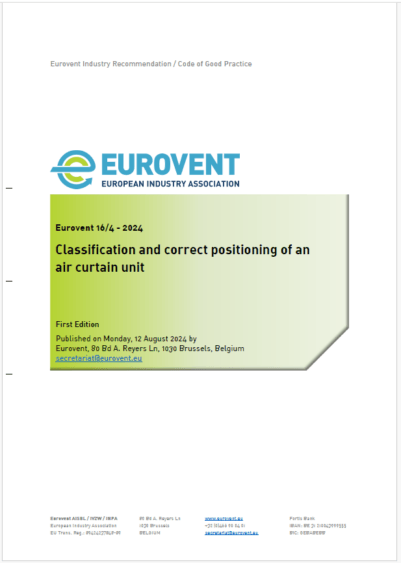With global energy consumption related to cooling expected to triple by 2050, the world’s largest climate congregation has put cooling into the spotlight for the first time in its history. The introduction of the Global Cooling Pledge during an event on 05 December 2023 at COP28 is considered one of the key outcomes of this year’s climate conference. Markus Lattner, Managing Director of Eurovent Middle East, outlines several key takeaways from COP28 and its side events.
It is a very positive step for COP to acknowledge the critical role the HVACR sector plays regarding greenhouse gas emissions, but also in providing essential cooling for food safety and people’s health. With energy consumption related to cooling expected to triple by 2050, the International Energy Agency, along with other institutions and organisations, from environmental groups to industry associations, call for the attention of governments and political leaders.
History
Following the implementation of the Montreal Protocol in 1987, the international community, spearheaded by UNEP and with the support of the dedicated Multilateral Fund, has been working intensively on the phase-out of ozone-depleting substances. This focus has been adapted over time by looking not only at the ozone-depleting potential but also generally on global warming potential, and ultimately, during the Kigali convention, has extended to energy efficiency and decarbonisation.
While over the years, most nations have established infrastructures and departments dealing with the ozone topic, the work on energy efficiency has remained either neglected, or was dealt with by other government departments, like standardisation bodies and regulatory authorities. This background explains why, over all the years, the focus of concern for UNEP and its various sub-organisations and initiatives remained on the chiller and air conditioning side.
New perspectives
Eurovent Middle East has been introducing new perspectives in several discussions and events organised in partnership with UNEP. While fully supportive of refrigerant transition and more energy-efficient cooling appliances, it has brought to the attention the important yet greatly neglected issue of ventilation. After all, an excellent, energy-efficient chiller will not deliver its performance if the energy is lost during the transport of the cooled air into the rooms. Or rather, the chiller will perform, but it will not make much difference.
A holistic and systemic approach is necessary if any energy efficiency targets stipulated by pledge, policy, or regulation shall be achieved. And here, MEPS alone cannot and will not help. Interventions, regulative as well as educational, are required to facilitate a higher grade of system integration and better installation, operation, and maintenance of HVACR systems. With the HVACR Leadership Academy, Eurovent Middle East has introduced an answer to years of discussing and arguing on COP level.
The Cooling Pledge
For anyone interested, this link provides a good summary of the background of the Global Cooling Pledge as well as its full text in Annex 1. The pledge shall increase ambitious efforts and international cooperation through joint targets on reducing GHG emissions related to cooling, improving energy efficiency, taking a climate-friendly approach, and expanding access to sustainable air conditioning for vulnerable groups in society.
It shall commit nations, among other points, to:
- Work together with the aim of reducing cooling-related emissions by at least 68% relative to 2022 levels by 2050
- Support increased market penetration of highly efficient air conditioning equipment and innovative technologies and to collectively increase the global average efficiency rating of new air conditioning equipment sold by 50% by at the latest 2030 from the global 2022 installed baseline
- Ratify the Kigali Amendment by 2024, if not already ratified
- Publish a national cooling action plan, considering cooling when publishing a national action plan, or publishing a regulation or equivalent by 2026 and to reflect relevant efforts in designing nationally determined contributions under the Paris Agreement and HFC phase-down plans
The pledge has been initially endorsed by 63 countries, with more expected to follow over time. Among the European countries signed are Belgium, Czechia, Denmark, France, Germany, Netherlands, Norway, Spain, and the UK; other major signatories so far include Brazil, Japan, USA, and the host country UAE. No other country in the GCC has yet endorsed the pledge and time will tell if this initiative gains momentum.
While critics may see this paper as mostly a public relations spectacle, integral reporting mechanisms may actually effect some meaningful regulatory interventions, especially in developing countries. At the very least, it can provide leverage for the industry to request more action from governments that have not moved at all in regard to implementing energy efficiency requirements.
Takeaways
Eurovent could bring new perspectives to the table, which will be taken on by UNEP in the next year and brought to wider attention as was possible during COP28. The aspects of ventilation have been eye-opening for the audience and highly appreciated by UNEP. The cooperation between both organisations has been very beneficial and educational and we look forward to continuing and intensifying the relationship in the next years.
The Cooling Pledge will have to prove itself, but we should give it credit for the time being and see it as the first big step in putting cooling in the spotlight. Higher energy efficiency requirements will provide better business opportunities for our members, who have invested heavily in better products and technologies.
A note for last: 97.000 accredited people discussing climate change raises the question of the carbon footprint of COP28. And while colourful and diverse, the crowds and crowded agendas, the hundreds if not thousands of side events, mostly in front of only a handful of people, have not left a very efficient impression and rather cause doubt about our capabilities to save the planet from overheating. Perhaps that explains the booth from the ‘St. John and Mary Baptist Church’ from Eswatini at this year’s edition of COP – perhaps we need more prayers.



















